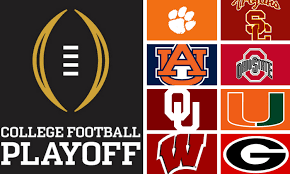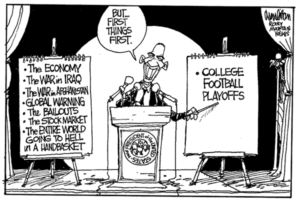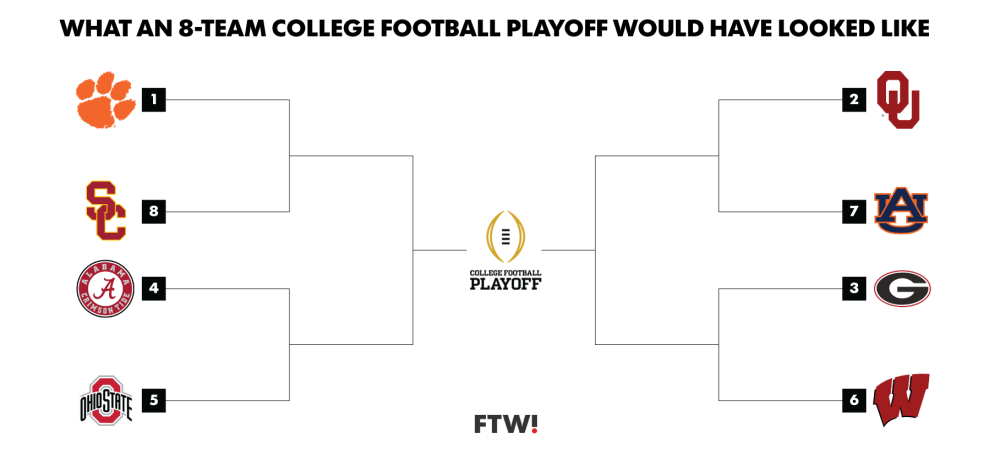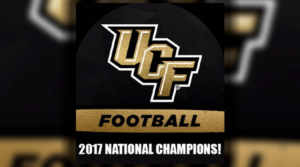College Football Playoff Debate – 4 Teams or 8?
Debate Continues on College Football Playoff but No Changes Planned
The college football season kicks off at the end of August and the college football playoff debate continues. There is a new college football playoff selection committee with six new members appointed to the CFP committee with each serving a 3-year term that started this spring.
The CFP Selection Committee is responsible for selecting the top four teams in the playoff and assigning them to semifinal games as well as placing the next group of teams in the remaining New Year’s bowls. The selection committee meets in-person beginning late in the football season and produces a ranking of the top 25 teams each week, leading up to its final selections.
 The 2019 college football playoff is in the Bay area, and there will be 4 teams in the playoff. Same with 2020 in New Orleans, 2021 in Miami, 2022 in Indianapolis, 2023 in Los Angeles and 2024 in Houston. There are no talks of expanding the current format until beyond 2026 according to Bill Hancock, executive director of the CFP. The Cotton Bowl, Fiesta Bowl and Peach Bowl have contract agreements with the CFP for six more years. The Sugar Bowl, Rose Bowl, and Orange Bowl had pre-existing 12-year deals with the CFP to be a part of the rotation.
The 2019 college football playoff is in the Bay area, and there will be 4 teams in the playoff. Same with 2020 in New Orleans, 2021 in Miami, 2022 in Indianapolis, 2023 in Los Angeles and 2024 in Houston. There are no talks of expanding the current format until beyond 2026 according to Bill Hancock, executive director of the CFP. The Cotton Bowl, Fiesta Bowl and Peach Bowl have contract agreements with the CFP for six more years. The Sugar Bowl, Rose Bowl, and Orange Bowl had pre-existing 12-year deals with the CFP to be a part of the rotation.
Last season, Central Florida (UCF) was left out of the four-team playoff despite an undefeated season (13-0). Playing in the American Athletic Conference (AAC), or any other non-power conference leaves no chance for any of those teams to play for a national title. Right or wrong, that’s the way the CFP is set up and even designed, as those teams don’t play a strong enough schedule to compete with the top teams from the SEC, Big Ten, Big 12, ACC and Pac 12.
Last season, perennial power Alabama made the CFP without winning its division in the SEC or playing in the conference championship game. Yet the Crimson Tide were awarded a final four berth into the playoff, and then went on to beat Clemson in a national title rematch from 2017.
While the CFP believes no changes or tweaks to the current playoff system are necessary, others, including coaches, believe there is a better and more fair system. Scott Frost, who coached UCF to last year’s undefeated season and is now the new head coach at Nebraska, believes like others that an 8-team playoff will bring more teams of strength into the  playoff. Think of it like a wild card in baseball, a strong team like this year’s NY Yankees, who gets the playoff invite and is a worthy championship contender. Those college football teams like UCF or stronger power five teams can compete for a national title.
playoff. Think of it like a wild card in baseball, a strong team like this year’s NY Yankees, who gets the playoff invite and is a worthy championship contender. Those college football teams like UCF or stronger power five teams can compete for a national title.
Inviting all Power Five conference champions and adding three at-large teams would not only allow a strong non-champion team like Alabama to be included, but also smaller conference powers. Teams like UCF last year or perhaps Boise State this season would have something even bigger to shoot for than a regular season title or conference championship. The power conferences would still get two or all three of those spots nearly every season, but there is usually plenty of strength and depth with many 1-or-2 loss teams to choose from in the power conferences. Wisconsin was one Big Ten championship game win away from an undefeated season and making last year’s 4-team playoff, which would have likely left Alabama on the sidelines. In an 8-team playoff, Wisconsin, along with Ohio State and UCF would have been included last year.
An 8-team playoff could certainly start sooner, but it would also add more games to those playoff teams’ schedule as they advance. That adds more practices, meetings, activities and injury potential to players, who also have final exams to deal with during December. Still, it’s rather ridiculous that many college football teams have nearly a 30-day break from their final regular season or conference title game to their next bowl game.
 The evolution into a 4-team playoff that began following the 2014 regular season has been good for college football by most measures. More than 26 million viewers tune into ESPN to watch the playoff championship game annually. But the greater interest is due to a playoff format itself, which was lacking the previous 15 years when polls and computer rankings were used to determine a national champion.
The evolution into a 4-team playoff that began following the 2014 regular season has been good for college football by most measures. More than 26 million viewers tune into ESPN to watch the playoff championship game annually. But the greater interest is due to a playoff format itself, which was lacking the previous 15 years when polls and computer rankings were used to determine a national champion.
The stakes rise in college football during November when the CFP starts producing its weekly rankings. There are more match-ups that become meaningful as the focus intensifies on the four-team race during the closing stretch of November college football. The current CFP system has created more drama, and the college football regular season is already an unofficial playoff system each week.
But as much as an 8-team playoff makes sense to many people, who see the growth and interest in college football, understand that money and power win out a vast majority of the time. Look at the new partnerships with the evolution of legalized sports betting as major brands and gaming and tech companies have come together, and even gaming companies and major sports leagues (MGM/NBA). The broadcast networks also have partnerships and agreements, and ESPN specifically has more than $7 billion invested in the CFP and even more billions than that on rights deals with the five power conferences. Power and money win again, and the smaller conferences with lower budgets lose, at least in terms of competing for a national championship. So too does the common fan that wants to attend a playoff game, as the staggering costs also shows that the big games are for the people with big bucks.
The lower-tier bowl games are also losing money and viewers with the focus on the 4-team playoff, yet the New Year’s Six bowls have continued to generate greater interest as the CFP controls those rights with contract agreements and more money. Thus, the next tier of top teams from the major conferences are invited by the CFP committee to fill those slots in the remaining four bowl games. Central Florida, as the only undefeated team in the country last year, was an insulting  10-point underdog to Auburn in the Peach Bowl. UFC won 34-27. Of course Auburn was playing with the disappointment of missing out on the 4-team playoff when they lost in the SEC Championship game to Georgia. An 8-team playoff format would have had both those teams invited to the playoff party with a chance to compete for a national championship. UCF was also the third non-Power Five team in four years to win a New Year’s bowl game. The Knights were good enough to earn a national title shot, but denied the opportunity by the powers that be and the current college football playoff system.
10-point underdog to Auburn in the Peach Bowl. UFC won 34-27. Of course Auburn was playing with the disappointment of missing out on the 4-team playoff when they lost in the SEC Championship game to Georgia. An 8-team playoff format would have had both those teams invited to the playoff party with a chance to compete for a national championship. UCF was also the third non-Power Five team in four years to win a New Year’s bowl game. The Knights were good enough to earn a national title shot, but denied the opportunity by the powers that be and the current college football playoff system.
So was Penn State in 2017, despite the Nittany Lions winning 9-straight games to close the season, including the Big Ten Championship. The CFP committee instead selected Ohio State, who lost to Penn State during the regular season. Money and brand interest matters for ratings and more money. Ohio State was then blown off the field by Clemson 31-0 in the CFP semi-final playoff game. That CFP invitation and result should have sent a stronger message to the committee regarding a potential change of the 4-team format. But instead the CFP committee and NCAA remain on their own path and makes its own deals and agenda with the power to rule like the current president of the United States.
 Imagine if there was an 8-team playoff, and the greater interest and excitement in those meaningful games. Legalized sports betting will add more money to the mix and gamblers watch and bet even more on the biggest and higher profile games. That’s not necessarily the best strategy to profit long term for bettors, but it would likely be more profitable for the NCAA and its major conference teams, who all benefit by the tens of millions with their sponsorship and broadcasting agreements. Perhaps when the CFP sees the profit potential of more money and sponsorship dollars coming from other sources including gaming and tech companies, then a change would be considered closer to the year 2030.
Imagine if there was an 8-team playoff, and the greater interest and excitement in those meaningful games. Legalized sports betting will add more money to the mix and gamblers watch and bet even more on the biggest and higher profile games. That’s not necessarily the best strategy to profit long term for bettors, but it would likely be more profitable for the NCAA and its major conference teams, who all benefit by the tens of millions with their sponsorship and broadcasting agreements. Perhaps when the CFP sees the profit potential of more money and sponsorship dollars coming from other sources including gaming and tech companies, then a change would be considered closer to the year 2030.
Understand that the CFP and the committee isn’t about the student-athlete, although they would argue that point. The student-athletes will be harmed even more by an expanded playoff system. The CFP is about fans wanting a national champion determined on the field and more fairness instead of through other means and selective invitations to the big dance and playoff party. It’s about coaches and athletics directors wanting an expanded playoff system to give their team more shots to reach the playoffs and for better job security and opportunities for their players and university.
But it’s mostly about money. And for the next decade a 4-team college football playoff will continue.
You can bet on it.
Article posted at osga.com.

 Twitter
Twitter Facebook
Facebook